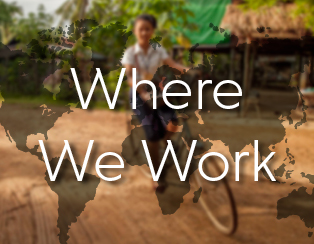Education Prevails: Nigerian teachers discuss challenges in COVID-19
By Janey FugateMay 27, 2020
For more information and updates about Creative and our programs’ response to COVID-19, click here.
As schools around the world remain closed amidst the coronavirus pandemic, the learning gap for students continues to grow. According to UNESCO, 777 million children and students have been withdrawn from schools and universities in a total of 100 countries. Throughout our series “Education Prevails,” we speak with women and men from across the sector to explore the challenges, innovations and humanity involved in caring for children worldwide during COVID-19.
In places like Nigeria where education environments are already fragile and in need of more resources, the educational disparities (whether economic or gender-related) that normally affect children have become even more pronounced.
Head teachers Jamila Zakari, of the the Dr. Ibrahim Tahir Primary School, and Murtala Yusuf, of Gzamo Primary School, work with USAID’s Northern Education Initiative Plus project comment on COVID-19’s impact on their pupils and schools from firsthand experience.
Promoting equality for girls in education is a big priority for the development sector, both in general and especially as programming is disrupted during the pandemic. What are the challenges there for keeping girls learning in an already vulnerable environment?
Jamila: We don’t really know how long the lockdown will last and we don’t know what arrangements will be made for the students to safely go back to school. Because there are still those who don’t believe that girls need to go to school, or that elementary school is just enough for them, I fear that some parents will end up deciding to get them married, especially if it’s a longer period of time before classes resume.
Most of the mothers of the kids we teach are housewives, so that’s the path to womanhood that they grow up accustomed to seeing. Without schools giving them skills and chances to imagine other possibilities, these windows of opportunity will close for them.
Radio lessons to promote reading and learning from students’ homes have been a success. But what are some of the challenges you’ve seen with distance learning in Nigeria even as these virtual lessons are rolling out?
Murtala: Teaching is delivered through the radio, so our pupils will be learning through the radio lessons. Even though the project leverages a big network to communicate about the lessons, access is still a challenge as parents, especially in the rural areas, become familiar with the ongoing radio program. In some cases, some parents may not have access to the radio.
Keeping parents engaged and motivated is really important, too. At the beginning of the pandemic, I called a meeting with the parents and I told them that they cannot just fold their arms. I encourage parents to teach their kids and keep them learning because we cannot wait for the government. It is all of our responsibility to help our children right now.
I also think that teachers will need a period of training and recovery too after the restrictions lift. We need to support teachers as much as students so they can be well positioned to get kids on the right track when schools open.
Jamila: Families in better economic situations have more access to technology they can use to continue their children’s education under lockdown. Some even have resources to hire private tutors.
But many rural families are facing food shortages and don’t have the same resources or access. Imagine trying to get parents to keep their kids tuned in to the radio lessons when their kids are hungry. So I think the pandemic exposes inequalities in the education system.
If the lockdown continues for much longer, there will be a need for organizing catch up programs for students before the next term starts, as well as programs designed for teachers.
On a more personal note, why do you teach? What keeps you motivated in difficult circumstances?
Jamila: I just have a passion for teaching ever since I was a kid. In the third world, kids don’t grow up wanting to be teachers because they consider them to be poor. But I always wanted to be a teacher. When other kids raised their hands and said ‘I want to be a doctor’ or a lawyer, I always said teacher. I have three kids at home that I’m teaching, so I’m keeping that passion up. I’m also reaching out to colleagues to see how they are.
Murtala: The moment you step into Nigeria, you will see that the education sector and teachers do not get the respect they deserve. We are not regarded as people who are ‘successful.’ But I still love it. I went to a teachers’ college. I am a teacher because I want to help our young ones become good citizens.


